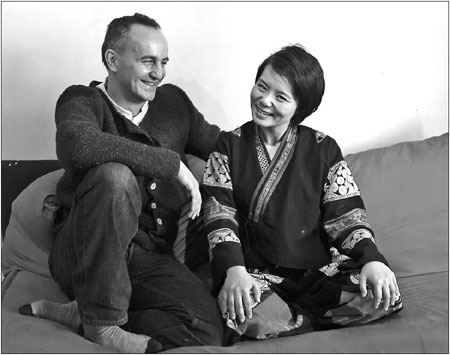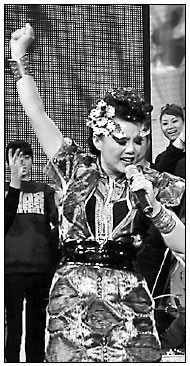Partners in music
|
Gong Linna with her music-producer husband Robert Zollitsch in their Beijing apartment. Zou Hong / China Daily |
|
Gong Linna sings Tan Te, or Perturbed, that has become an Internet sensation. Provided to China Daily |
Folk singer Gong Linna went from popularity to anonymity before finding her true voice. Chen Nan reports.
Gong Linna was a struggling folk singer before her lyric-less song Tan Te, or Perturbed, composed by her German husband, became an Internet sensation. Her powerful voice, wide vocal range and dramatic facial expressions drew rave reviews. She first performed the 4-minute song in Berlin in 2006, but it wasn't picked up in China until 2009, when it began doing the rounds on the Internet.
It caught the attention of diva Faye Wong who tried to learn the song but admitted it was too hard to master. She mentioned this on her Sina Weibo micro blog and that brought Gong to the public's attention. Cross-talk comedian Guo Degang was another high-profile fan, who did a hilarious imitation of Gong on his show.
Since then the 35-year-old has been busy performing live all over the country, even at rock concerts, which is rare for a folk singer. She has been invited to many TV galas, as well as the upcoming Beijing New Year Music Concert at The Great Hall of the People.
"Tan Te was a song from one of my concerts of experimental music in 2006, for which my husband wrote all the songs," she says sitting besides her music-producer husband Robert Zollitsch, 44, in their cozy apartment in Beijing's Chaoyang district.
"I was not surprised to be introduced to Tan Te as I have performed many of my husband's songs. But the song requires continuous breathing and voicing, which is hard, and I had to practice it over and over again. Lacking lyrics, the song's meaning is the music itself."
Her husband, whom Gong refers to by his Chinese name Lao Luo, says, "The song was originally accompanied by no instruments but human voices, and I experimented with a band supporting her only later.
"It is not my favorite work so far but I believe the popularity of the song will allow more people to know our music."
Gong, who started singing at the age of 5, has broken all the rules of traditional Chinese folk singing.
A star singer in her hometown, Guiyang, capital of Guizhou province, southwest China, she was never shy while performing in front of people. Instead of feeling nervous, she felt excited at all the attention.
"The more the audience, the better I felt. I loved acting and singing on stage," she says.
With Guiyang being home to 15 ethnic groups, Gong would often listen to their folk songs and imitate their dances in her childhood. It was that early exposure that helped mould her distinctive voice and style, she says.
"My voice had a wide range, and high notes were never a problem for me. I felt singing was an inborn gift," Gong says.
The musically versatile young girl enrolled to study folk music at the Chinese Conservatory of Music in Beijing at 16. She held her first solo concert in 1999 and cooperated with the China Central Nationalities Orchestra, China's most prestigious traditional music orchestra. In 2000, she won the Chinese National Singing Competition as best female singer and became a popular figure at various galas.
Her future looked bright and promising, but as time went by, Gong felt anxious and lost. Although she was pursuing fame like other singers, she did not feel at ease with all the lip-synching and stereotyped performances.
"I was terrified when I looked at myself in the mirror in glamorous gowns and high heels, because I had no voice on stage. I felt like a puppet, devoid of life and emotion," she says.
She recalls how she was even willing to pull out her two front teeth because of a slight gap between them to look better in front of the camera.
"It seems ridiculous now. But at that time, when singers were battling for opportunities and trying to make more money, I was prepared to go to any length for success," she says.
"But, it's meaningless to sing without voice and feeling."
She returned home and began to live among the ethnic Miao.
"I observed their simple and happy lives. Elderly women would sing all day long - whether combing their hair, cooking or doing housework," she says. "I was determined to show people that singing should be a happy experience and a way of personal expression, rather than about following rules."
She traveled to Shaanxi, northwestern China, to learn the local folk music, such as Lan Huahua, or Blue Flowers, which comes in more than 20 styles.
Her struggles ended when Lao Luo and his music entered her life. He has written most of the music for Gong's six albums so far. His love of reading and writing traditional Chinese poems enabled him to compose music with lines from famous poems such as Tang Dynasty poet Li Bai's Jing Ye Si, or Thoughts on a Still Night and Bai Juyi's Ye Xue, or Night Snows.
He also found her a band, including musicians from around the world, such as Xiong Junjie, a veteran player of yangqin, a Chinese hammered dulcimer. For Gong, who grew up singing with karaoke tapes, singing with a live band was a fresh and challenging experience.
When the couple first met in 2002, at a concert in Beijing, Lao Luo played the zither, a classical Bavarian folk music instrument. Impressed by his singing, Gong later learnt that Lao Luo had been listening to traditional Chinese music since 1993, and had gone on to study the Chinese zither, guqin, in Shanghai.
When they worked together for the first time, Gong burst into song spontaneously to his music. "I laughed and cried while singing because I was overwhelmed by emotion and knew that I was singing for myself," Gong says while looking at her husband.
After moving with her husband to Berlin in 2004, Gong regained her confidence as a singer and enjoyed life as a wife and mother of two boys, born in 2005 and 2008.
Calling their music new Chinese art music, the couple insist that the essence of traditional Chinese folk songs needs to be preserved even as it is integrated with new forms. In 2003, Gong gave her first performance abroad in an outdoor music festival in the Netherlands.
"I felt nervous on stage for the first time in my life," she says.
Tian Qing, director of Research Institute of Music of the Chinese Academy of Arts, calls Gong's works "a breakthrough in the field of traditional Chinese folk music" and "a chance for the public to get to know this music genre".
"Unlike other students who follow the teachers' instruction and obey the books, Gong was a serious student with independent ideas," says Tian, who knew Gong as a student in the conservatory.
"The popularity of Tan Te is accidental and Gong is definitely more than that."
For Gong, the biggest reward is that "finally I can sing with my own voice on stage".
(China Daily 01/22/2011 page11)




















